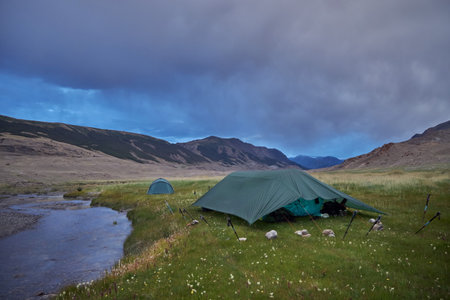Introduction to Wild Camping in the UK
Wild camping across the UK is a uniquely British adventure, offering an escape into some of the most breathtaking natural landscapes England, Scotland, and Wales have to offer. However, before pitching your tent under the stars, it’s crucial to understand the distinct legal frameworks and traditions that shape the wild camping experience in each country. In Scotland, thanks to the Land Reform (Scotland) Act 2003, wild camping is largely permitted on unenclosed land, provided you follow the Scottish Outdoor Access Code—respecting nature and those around you. In contrast, wild camping in England and Wales is generally more restricted, with most land privately owned; here, campers usually require landowner permission except for select areas like Dartmoor National Park, which recently had its rights clarified in court. Despite these variations in legality, a shared tradition of responsible outdoor exploration unites wild campers across Britain. The diverse terrain—from rugged Scottish highlands to rolling Welsh hills and peaceful English woodlands—demands both respect for local customs and suitable gear to handle changeable weather conditions. This article will guide you through the best tents for wild camping in each region, ensuring you’re well-prepared for a safe and memorable UK wilderness experience.
Key Factors When Choosing a Tent for UK Wild Camping
Wild camping across England, Scotland, and Wales comes with its own unique set of challenges. From the relentless drizzle of the Lake District to the gusty heights of Snowdonia and the boggy moors of the Scottish Highlands, British campers must be prepared for anything. Selecting the right tent is not just about comfort—its a matter of safety and practicality. Here, we highlight essential features tailored for British weather, terrain, and backpacking needs.
Weather Resistance: Waterproofing & Windproofing
The UK’s weather is famously unpredictable. Your tent must withstand heavy rain, persistent damp, and strong winds. Look for tents with:
- High Hydrostatic Head (HH) Ratings: Aim for 3000mm or above for flysheets.
- Taped Seams: Prevent water ingress at vulnerable stitching points.
- Robust Poles: Aluminium poles are preferred for their strength in windy conditions.
Packing Weight & Portability
Backpacking wild campers need to balance durability with weight. The table below summarises recommended weights according to trip length:
| Trip Duration | Recommended Tent Weight (per person) |
|---|---|
| 1-2 nights | Up to 2kg |
| 3-5 nights | 1.5–2.5kg |
| Extended trips | Under 2kg (lightweight models preferred) |
Pitching & Practicality in British Terrain
You’ll encounter everything from rocky hillsides to muddy fields. Key considerations include:
- Freestanding Design: Useful on hard or uneven ground where pegs struggle.
- Vestibules: Essential for keeping muddy boots and kit dry overnight.
- Midge-proof Mesh: Particularly vital in Scotland during summer months.
Sizing and Comfort: Single vs Multi-Person Tents
Tent capacities can vary; UK wild campers often prefer a tent rated for one extra person for added space—particularly when storing gear inside to protect it from rain or theft.
Sustainability & Local Suitability
Increasingly, UK brands are offering eco-friendly options made from recycled materials or using PFC-free waterproof coatings—worth considering if you want to reduce your environmental impact while exploring Britain’s natural beauty.
By evaluating these key factors through a distinctly British lens, you’re more likely to select a tent that will keep you dry, comfortable, and safe wherever your wild camping adventures take you across England, Scotland, or Wales.

3. Top Recommended Tents for UK Wild Camping
Choosing the right tent can make or break your wild camping experience, especially given the unpredictable British weather and the variety of landscapes across England, Scotland, and Wales. Below is a carefully curated selection of tents that have been tried and tested by local campers, reflecting both practical engineering considerations and honest user experiences.
Vango Banshee Pro 200
Pros
- Lightweight (around 2.4kg), ideal for backpacking across rugged terrains.
- Robust against wind and rain, making it well-suited for Scottish Highlands and Welsh hills.
- Quick pitch time—often under 10 minutes, great for unpredictable UK weather.
Cons
- Tight fit for two adults with kit; best as a roomy solo tent.
- Ventilation can be limited on warmer nights.
Local Feedback:
“Stood up brilliantly during a gale in Snowdonia. Kept me dry and felt solid all night.” – Tom from Cardiff
MSR Hubba Hubba NX 2
Pros
- Excellent weight-to-space ratio (1.54kg), perfect for long-distance hikes along the Pennine Way or West Highland Way.
- Packs down small, fits easily into standard UK rucksacks.
- Superb ventilation system prevents condensation in damp valleys.
Cons
- Premium price point may deter first-time campers.
- The pale colour isn’t the most discreet for wild pitches in sensitive areas.
Local Feedback:
“Really easy to pitch solo even in rain. Ventilation saved me from waking up to soggy sleeping bags.” – Rachel from Sheffield
Alpkit Ordos 2
Pros
- Great value for money—quality construction at a lower price than many competitors.
- Pitches inner-first or outer-first (handy in sudden British showers).
- Sourced from a UK-based company with reliable aftercare service.
Cons
- Slightly heavier than ultralight options (approx. 1.7kg).
Local Feedback:
“Perfect balance between price and performance—handled Dartmoor’s drizzle without fuss.” – Steve from Exeter
Wild Country Zephyros Compact 1
Pros
- Ideal for solo wild campers who need a compact, easy-to-carry shelter.
- Tough enough to withstand blustery conditions on exposed moors.
Cons
- Tight internal space; not recommended for those over 6ft tall or with bulky gear.
Local Feedback:
“A brilliant starter tent—never let me down on Lake District fells.” – Lizzie from Kendal
4. How to Pitch Responsibly and Leave No Trace
Wild camping across England, Scotland, and Wales is a cherished way to connect with the UK’s breathtaking countryside. However, it comes with a duty of care for the landscapes, wildlife, and local communities. Below are best practices for pitching your tent responsibly and ensuring you leave no trace—aligned with UK customs and guidelines.
Respecting Local Laws and Customs
England & Wales: Wild camping is generally not permitted without landowner permission, except in some areas like Dartmoor (with restrictions). Always seek consent if unsure.
Scotland: Thanks to the Land Reform (Scotland) Act 2003, wild camping is allowed on most unenclosed land, provided you follow the Scottish Outdoor Access Code.
Key Principles for Responsible Camping
| Principle | Guidance |
|---|---|
| Choose Your Spot Wisely | Select durable ground away from paths, water sources, and farmland. Avoid damaging plants or disturbing wildlife habitats. |
| Packing In & Out | Take all rubbish home—including food scraps and hygiene products. Use reusable containers where possible. |
| Minimal Impact Fires | Avoid open fires; use a camping stove instead. If fires are necessary (where allowed), keep them small and contained, leaving no scars on the ground. |
| Noise & Light Pollution | Keep noise to a minimum and use headlamps or torches sparingly to reduce disturbance to wildlife and other campers. |
| Sanitation | Bury human waste at least 30 metres from water sources and footpaths. Use a trowel and cover thoroughly. |
| Packing Up | Dismantle your tent early in the morning. Restore the site to its original condition—or better. |
Engaging with Local Communities
- Support rural businesses by shopping locally when possible.
- If approached by landowners or locals, be polite and explain your intentions clearly.
- Avoid camping in large groups—small tents tucked out of sight are less intrusive.
A Note on Tents: Matching Practice to Product
The best UK tents for wild camping should be lightweight, discreet in colour (greens or browns), and quick to pitch or pack down—qualities that support responsible camping etiquette across England, Scotland, and Wales. By choosing your equipment carefully and following these guidelines, you’ll help preserve these landscapes for everyone who wishes to wander them in future generations.
5. Wild Camping Essentials: Gear and Safety Tips
Embarking on a wild camping adventure across England, Scotland, or Wales requires more than just selecting the best tent—your kit and knowledge are vital to ensure both enjoyment and safety. Here’s an engineering-minded breakdown of must-have gear items, essential safety considerations, weather preparedness tips, and legal etiquette for wild camping in the UK.
Must-Have Kit Items Beyond Tents
While a reliable tent suited to UK conditions is fundamental, several other pieces of equipment are equally crucial. Invest in a quality sleeping bag rated for local temperatures, ideally with synthetic insulation due to the UK’s damp climate. A lightweight but robust sleeping mat will add insulation from the often cold and uneven ground. Don’t forget a compact stove and fuel—open fires are discouraged or outright banned in many areas, especially in Scotland’s national parks. Bring a headtorch with spare batteries, water purification tablets or filters (since natural water sources may not always be potable), and a first aid kit tailored for remote settings.
Safety Considerations
The British weather is notorious for its unpredictability; hypothermia is a real risk even in summer. Always pack layered clothing, including a waterproof jacket and quick-drying base layers. Study your chosen area beforehand: mobile signal can be patchy in Scottish glens or Welsh mountains, so carry a map and compass as backup navigation tools. Share your itinerary with someone trustworthy, and consider carrying an emergency whistle or even a personal locator beacon if venturing off-grid.
Weather Preparedness
Check the Met Office forecast before you set out and monitor it during your trip where possible. UK rain can be relentless—choose waterproof bags or dry sacks to keep your kit safe. Practice pitching your tent quickly at home to minimise exposure when arriving late or in adverse conditions. In exposed locations like Dartmoor or the Lake District fells, choose a pitch that offers natural shelter from prevailing winds but avoid low-lying spots prone to flooding.
Legal Camping Etiquette
Wild camping laws vary: it’s generally permitted in much of Scotland under the Scottish Outdoor Access Code (with certain exclusions), but elsewhere you’ll need landowner permission unless otherwise stated (e.g., parts of Dartmoor). Always leave no trace—pack out all litter, avoid damaging vegetation, and use a trowel to bury human waste at least 30 metres from watercourses. Respect local communities by keeping noise to a minimum and moving on after one night wherever possible.
Summary
Thoughtful preparation goes far beyond just choosing the right tent; it’s about ensuring you’re self-sufficient, respectful, and ready for whatever the wild British landscape throws your way. Combine technical kit choices with sound safety habits and responsible behaviour, and you’ll enjoy memorable—and sustainable—wild camping experiences across England, Scotland, and Wales.
6. Conclusion: Making the Most of Your UK Wild Camping Experience
Wild camping in the UK offers an incredible opportunity to reconnect with nature, challenge yourself, and discover the stunning diversity of landscapes across England, Scotland, and Wales. Whether you’re pitching up beside a remote loch in the Highlands, on a windswept Welsh hillside, or tucked away in an English woodland, having the right tent truly makes a difference to both your comfort and safety.
As you set out on your wild camping adventures, always remember that enjoying these beautiful spaces comes with a responsibility. Respect local laws—especially as access rights can vary greatly between Scotland, where wild camping is widely permitted, and England and Wales, where landowner permission is often required. Always practice Leave No Trace principles: take all litter home, avoid damaging vegetation, and leave each site as you found it for others to enjoy.
Safety should remain at the forefront of your planning. Check weather forecasts before heading out, let someone know your intended route and return time, and pack essential kit including navigation tools and first aid supplies. The best tents for UK wild camping are those that strike the right balance between weight, durability, and protection from the elements—qualities that allow you to camp confidently even when conditions are less than ideal.
Ultimately, wild camping is about more than just equipment—it’s about immersing yourself in the great British outdoors, slowing down to appreciate starry skies, peaceful mornings, and the simple joy of self-reliance. Whether you’re an experienced camper or just starting out, there’s endless adventure waiting in the hills, forests, and coastlines of Britain.
So pick your tent wisely from our recommendations, plan thoughtfully, camp responsibly, and embrace everything that wild camping in the UK has to offer. The freedom and beauty of the countryside await—happy camping!

